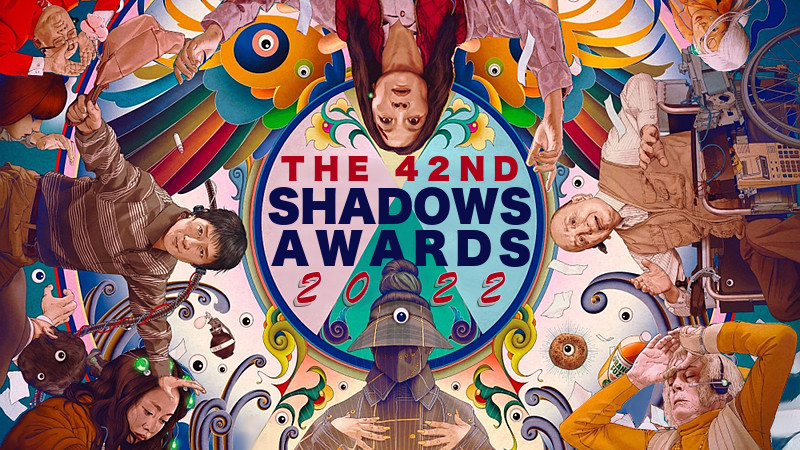| SHADOWS ON THE WALL | REVIEWS | NEWS | FESTIVAL | AWARDS | Q&A | ABOUT | TALKBACK | |||||
 Shadows off the beaten path Shadows off the beaten pathIndies, foreign, docs and shorts...
On this page:
INCREDIBLE BUT TRUE |
KLONDIKE |
NO BEARS
| |||||
| See also: SHADOWS FILM FESTIVAL | Last update 14.Sep.22 | |||||
|
Incredible But True Incroyable Mais Vrai Review by Rich Cline | 
| |||||
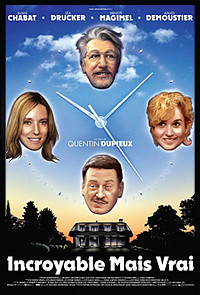 dir-scr Quentin Dupieux prd Thomas Verhaeghe, Mathieu Verhaeghe with Alain Chabat, Lea Drucker, Benoit Magimel, Anais Demoustier, Stephane Pezerat, Marie-Christine Orry, Roxane Arnal, Lena Lapres, Gregoire Bonnet, Hiro Uchiyama, Mustapha Abourachid, Antonia Buresi release Fr 15.Jun.22, UK Aug.22 frf 22/France 1h14 BERLIN FILM FEST  Is it streaming? |
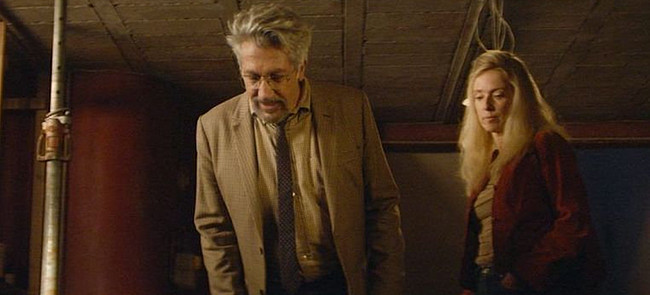 French filmmaker Quentin Dupieux delights in telling wildly bonkers stories with a straight face. This lightly farcical tale involves time travel but delights in never quite explaining it. But while the premise is blatantly silly, with several riotously funny scenes along the way, the film has a warm heart that brings its characters to life. So while the central point feels somewhat simplistic, it's an engaging little romp. House-hunting in the suburbs, Alain and Marie (Chabat and Drucker) buy a home that seems too good to be true, even if it needs a little work. Beneath the basement, down a long manhole-style tunnel, is something the estate agent (Pezerat) describes as a dazzling selling point: the same house 12 hours in the future or past. Marie sees this duct as a potentially life-changing route to eternal youth, while Alain prefers to live his days organically. Then they discover that Alain's boss Gerard (Magimel) and his girlfriend Jeanne (Demoustier) live on the same street. Explained in a matter-of-fact way, the bizarre nature of this temporal shift evokes a range of potential repercussions that are revealed as the film progresses, but Dupieux never gets bogged down in the details. And the script has other absurdities too, such as Gerard chatting casually about his new electronic penis, which he can control with a phone app. Dupieux makes witty transitions between scenes, playfully poking fun at each character's preoccupations, most notably in an extended montage sequence that pushes the narrative forward without the need for dialog. Chabat is terrific as Alain, who struggles to come to grips with this magical passageway. When Marie leaves a note saying, "See you tomorrow," he's genuinely flummoxed. Drucker gives Marie an overexcited interest in the possibilities of this magic, delighted with each change in her appearance, however microscopic. Meanwhile, Magimel's Gerard is similarly obsessed with his own gadget. Alain is amusingly drawn into both of their dramas, even though he cares about neither. And Jeanne is too self-absorbed to notice any of this. Under the surface, the film is a remarkably witty exploration of what it means to be human, most notably in relation to ageing and masculinity. Both Marie and Gerard go to ridiculously exaggerated lengths to fight nature, but the underlying point is quietly clear in Alain's decision to age gracefully and enjoy the smaller things in life, like playing with the old neighbourhood cat. It's not earth-shattering insight, but rather a gently amusing reminder of what's truly important.
| ||||
|
Klondike Review by Rich Cline | 
| |||||
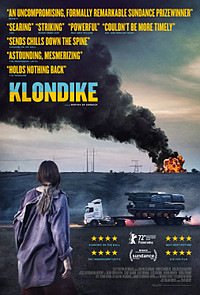 dir-scr Maryna Er Gorbach prd Maryna Er Gorbach, Sviatoslav Bulakovskyi, Mehmet Bahadir Er with Oksana Cherkashyna, Serhii Shadrin, Oleh Shcherbyna, Oleh Shevchuk, Evgenij Efremov, Artur Aramian, Oleksiy Konovalenkov, Nazir Samedov, Anatolij Ohorodnyk, Amdrii Iaroshevskii, Tetiana Misik, Serhii Momot release UK Oct.22 lff, Ukr 3.Nov.22, US 4.Aug.23 22/Ukraine 1h40 SUNDANCE FILM FEST BERLIN FILM FEST  Is it streaming? |
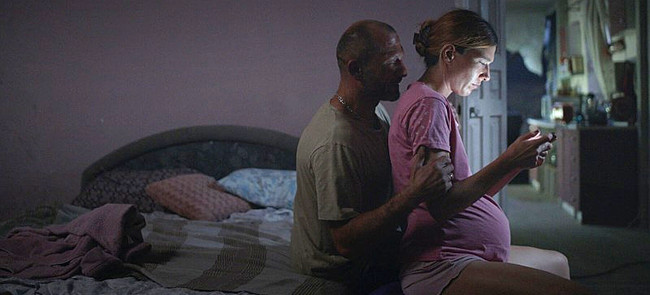 Set during Russia's invasion of Ukraine in 2014, this earthy and gorgeously shot drama is infused with pitch-black irony. The setting is reminiscent of the American West, with isolated farms and endless horizons, but writer-director Maryna Er Gorbach fills scenes with present-day attitudes and feelings that are more timely than she could have imagined. Seen through a woman's eyes, it's a gripping mix of personal drama and punchy themes. Preparing for the birth of their first child, Irka and Tolik (Cherkashyna and Shadrin) are jarringly reminded that Russia is waging war in their region. But they can't get to the hospital because their separatist friend Sanya (Shevchuk) has borrowed their car. As tension rises in their marriage, Irka's hotheaded younger brother Yaryk (Shcherbyna) turns up, squaring off against the apolitical Tolik, whom he views as Russian scum. Meanwhile, Irka thinks the freshly bombed hole in their home would make a nice picture window, if only there was something other than destruction to look at. In the opening scene, a jokey conversation about remodelling their farmhouse to make it a dream home is interrupted by a missile blast. Cut to Irka going into labour as she dusts the decimated living room, then heads to the barn to milk an understandably nervous cow as debris falls from a downed Malaysian passenger plane. But this is shot in a quietly observant style that makes these momentous events feel matter-of-fact, mixing in actual documentary footage to send chills down the spine. Performances are also skilfully understated, revealing layers of emotions beneath sometimes intense physicality. Cherkashyna depicts Irka's steely tenacity to get on with life, almost unbelieving that men are stupid enough to fight between nations and each other. And as Tolik, Shadrin seethes with rage at the pointless cruelty that is destroying his hope. Both are hugely sympathetic characters who maintain their composure even as soldiers crawl all over their farm. And the interaction between them shifts in fascinating directions. Tolik calls Sanya an idiot for believing that Russians will make their life better, echoing political discourse around the world at the moment. Because of the intimate perspective, expertly photographed by Sviatoslav Bulakovskyi, Er Gorbach draws the audience deep into each scene as a happy life gradually disintegrates in front of our eyes, as if this is the beginning of a post-apocalypse. It's a bracing mix of warmth, wit and urgency, and under its mostly calm surface the film feels like a wrenching cry for a lost future.
| ||||
|
No Bears Review by Rich Cline |  MUST
MUST  SEE SEE
| |||||
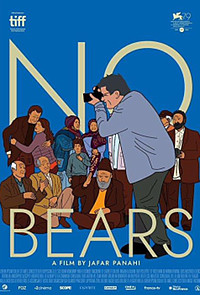 dir-scr-prd Jafar Panahi with Jafar Panahi, Vahid Mobasheri, Reza Heydari, Naser Hashemi, Bakhtiyar Panjeei, Mina Kavani, Narjes Delaram, Javad Siyahi, Amir Davari, Darya Alei, Yousef Soleymani, Sinan Yusufoglu release WP Sep.22 vff, US Oct.22 nyff 22/Iran 1h46  TORONTO FILM FEST Is it streaming? |
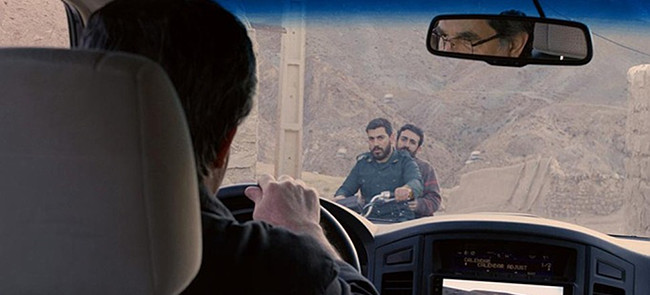 Despite being banned from making movies, master filmmaker Jafar Panahi continues to tell powerful cinematic stories from Iran. This hugely involving film uses wry humour to capture cultural absurdities that have an impact on two love stories, while further complicating the process of making movies. More importantly, this is a personal depiction of people who are struggling to survive when traditions and borders turn them into desperate refugees. Renting a room in a tiny Iranian village, Jafar is directing a film that's being shot over the border in Azerbaijan, overseen by his assistant Reza (Heydari). It's about a refugee couple (Panjeei and Kavani) in crisis because only one of them has received their fake passport. Meanwhile, Jafar's neighbour Ghanbar (Mobasheri) is helping him navigate an investigation by the local chief (Hashemi), who wants a photo Jafar never actually snapped. This involves a young woman (Alei) promised to a man (Siyahi) at birth, but she wants to flee over the border with another (Davari). Cutting between the two plot threads, Jafar navigates the customs of this small community while directing his movie over an unreliable internet connection. He is patiently polite with villagers, but their mistrust is apparent beneath kind words. And various people continually issue achingly personal pleas to Jafar to solve the problem, as if he could. Meanwhile, Reza tries to coax Jafar into sneaking across into Turkey to help guide his increasingly complicated movie to completion, even as the personal story they're shooting takes unexpected turns. Panahi has terrific on-screen presence, facing disruptions with a smile and a sigh while trying to do the right thing. His wry reactions are easy to identify with, a curious man who understand what's happening and knows to keep playing the game. Each character around him feels almost startlingly realistic, with Mobasheri particularly notable as the smiling, excitable Ghanbar, whose hilariously bumbling persona masks a shrewd operator. Even the smallest characters add layers of importance to the story, and their slippery dialog is beautifully written and played. Anyone who has ever found themselves caught up in an escalating situation for no real reason will find strong resonance here, admiring the quiet way Jafar simply faces each obstacle with grace. That he never loses his temper is remarkable, although he does continually speak his mind. And in tales of these two couples, further narrative angles offer insight into the way life rarely seems fair, how traditions often feel suffocating and that people shouldn't be labelled criminals for simply desiring to live freely.
| ||||

See also: SHADOWS FILM FESTIVAL © 2022 by Rich Cline, Shadows
on the Wall
HOME | REVIEWS | NEWS | FESTIVAL | AWARDS
| Q&A | ABOUT | TALKBACK | | ||||

